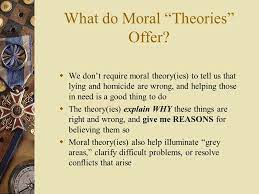Moral Theories and Lying. 2022 Best

This assignment we will focus on questions about moral theories and lying. Answers must show sufficient and accurate knowledge of the reading material ——Please Number the answers——- DP3: o Which moral theory best seems to reflect how you make moral decisions? Explain why with an example.
Moral Theories and Lying.
Answers must show sufficient and accurate knowledge of the reading material ——Please Number the answers——- DP3: o Which moral theory best seems to reflect how you make moral decisions? Explain why with an example. o Can you think of a situation in which a leader should lie to the public? Explain the circumstances in detail and include whether you think Bok would agree with you and why. Questions for RQ7: Moral Theories and Lying 1. What is a moral subjectivist? Also, can a moral subjectivist say that some horrible event, like the Holocaust, is universally and always wrong, regardless of who does it? Explain.
Moral Theories and Lying.
2. Explain why lying is wrong according to Kantian moral theory and give your own example to help explain it. 3. In the reading, there is an example about a surgeon who sacrifices one healthy patient for five sick ones. How does Act Utilitarianism differ from Rule Utilitarianism in determining the moral value of the surgeon’s actions? 4. Evaluate the example of a lie from the end of our reading about Joe on his deathbed. Was this lie (or lies) good, bad, or neither? Defend your answer. Questions for RQ8: Bok 1. How do rulers who tell “noble lies” think of themselves and those they rule?
Moral Theories and Lying.
2. What was President Johnson’s lie (or group of lies) about himself during the 1964 election? Why did he lie and were the lies justifiable? (pp.170-3) 3. According to Bok, should leaders tell lies when telling the truth “at a particular time might do great damage,” such as when the government is making a change in financial policy? What are her reasons? (pp.177-8) 4. At the end of the reading, what does Bok say is the only way leaders can justifiably lie in a democracy (p. 181)? Explain with an example. Questions for RQ9: Stern and Martineau
Moral Theories and Lying.
Why do they think they in particular have the right to lie, when compared to the rest of the public? (pp.167-9) 1. From Stern: 1. Explain what turns a person into a gaslighter. Also, is the gaslighter always aware of what he (it is most often a “he”) is doing? 2. According to Stern, why are men more likely to be gaslighters and women the victims of gaslighting? Do you find her reasons to be true? 2. From Martineau: 1. In 2010, were experts optimistic or pessimistic about the influence the Internet would have on society? For what reasons? 2. What are some of the major motivations for deception online? Give examples from the reading. https://youtu.be/jomMfhpMwpU
Additional Files







